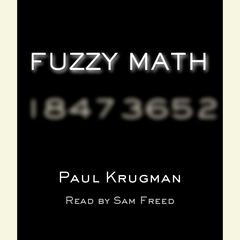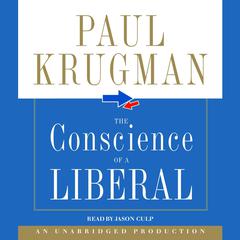 Play Audiobook Sample
Play Audiobook Sample
The Return of Depression Economics and the Crisis of 2008 Audiobook
 Play Audiobook Sample
Play Audiobook Sample
Quick Stats About this Audiobook
Total Audiobook Chapters:
Longest Chapter Length:
Shortest Chapter Length:
Average Chapter Length:
Audiobooks by this Author:
Publisher Description
Nobel Prize® winning economist Paul Krugman shows how today's crisis parallels the events that caused the Great Depression - and explains what it will take to avoid catastrophe. In 1999, Paul surveyed the economic crisis that had swept across Asia and Latin America, and warned that those crises were a warning for all of us: like diseases that have become resistant to antibiotics, the economic maladies that caused the Great Depression were making a comeback. In the years that followed, as Wall Street boomed and financial wheeler-dealers made vast profits, the international crises of the 1990s faded from memory. But now depression economics has come to America: when the great housing bubble of the mid-2000s burst, the U.S. financial system proved as vulnerable as those of developing countries caught up in earlier crises - and a replay of the 1930s seems all too possible. In this new, greatly updated edition of The Return of Depression Economics, Paul shows how the failure of regulation to keep pace with an increasingly out-of-control financial system set the United States, and the world as a whole, up for the greatest financial crisis since the 1930s. He also lays out the steps that must be taken to contain the crisis, and turn around a world economy sliding into a deep recession. Brilliantly crafted in Paul's trademark style - lucid, lively and supremely informed - this new edition of The Return of Depression Economics will become an instant cornerstone of the debate over how to respond to the crisis.
Download and start listening now!
"A great historic review of past recessions until the financial collapse. The book covers 1930 Bank run, 90' Japan, Latin America and Asian tigers, Russia, 2001, and 2008. The book has been written in the midst of the 2008 crisis, so it doesn't fully unfold the conclusions. But it doesn't matter this book is fantastic.There is also a great account of Black Wednesday when Soros's Quantum fund attacked the pound and caused Britain to leave the European Monetary System.I never really appreciated Krugman, but this book made me changed my mind."
— monsegu (5 out of 5 stars)
The Return of Depression Economics and the Crisis of 2008 Listener Reviews
- — Monsegu, 4/17/2022
-
" Krugman traces the roots of the current world-wide financial crisis and states that we must strictly regulate any bank-like financial activity to reduce the severity and frequency of such financial crises. He further states that the financial crisis has resulted in an economy with far more capacity to produce than demand to consume (ie., a depression type economy), a very serious problem that is best solved by massive government spending on infrastructure etc. The rest of the book is a head-spinning chronology of recent financial crises: much description, little explanation. I was hoping for some deeper economic insight but did not find it here; it's much more political than I would have preferred. "
— B., 1/18/2014 -
" This is a short (191 pages) understandable book that covers more than just the US crisis of 2008. This book includes descriptions of financial problems in other countries over the last quarter century. Describing how problems in Brazil, Indonesia and Japan were addressed with varying degrees of success puts the US crisis of 2008 in perspective. Krugman makes clear we are not out of the woods yet and offers suggestions on what is needed for recovery. "
— Nancy, 1/8/2014 -
" Very easy to easy to understand. There aren't any complicated terms in this book. Paul Krugman explains what happened in lame terms. I recommend it to everyone. "
— Fabian, 1/6/2014 -
" Sobering reminder of the economic challenges we face by the 2008 winner of the Nobel Prize in Economics. A surprisingly easy read, this book makes a complex subject understandable. "
— Bill, 1/5/2014 -
" Wish that I was able to understand this better than I did. Ecomonics are very hard for me to wrap my head around. "
— Lois, 10/30/2013 -
" A treasure trove of information on how modern governments mitigate financial disasters through stimulus spending, monetary policy, etc. Very important to understanding modern economic policies. "
— Sharon, 9/25/2013 -
" I love the part where the author writes: "The Great Depression was ended by a massive public works project called 'World War II.'" This conforms to history as related to me by one of world's great historians - my mother. "
— Barbara, 9/14/2013 -
" A good explanation of the crisis by a world renowned economist. And easy to read and understand. "
— Susanita, 7/20/2013 -
" My review of the book can be found here. "
— Zachary, 2/11/2013 -
" This is a fantastic read if you have any interest in economics or the current issues we face as a world. "
— Greg, 12/5/2012 -
" An excellent explanation of what's going on with the economy today. President Obama must have read this book, or has consulted Krugman. "
— Laurie, 8/13/2012 -
" I found this book so uneventful, that I don't remember even reading it. But I know I did. "
— Jade, 4/12/2012 -
" if you wish to know, from a liberal economist's POV, what is going on with the economy and why, as well as to gain an understanding of economic recessions and depressions from the last 100 years or so, this is the book to read. "
— Joshua, 3/28/2012 -
" For all his eccentricities, I enjoy Krugman's perspective. "
— Shelly, 3/2/2012 -
" Krugman says that the 1990s crises in Mexico, Argentina, Thailand, Japan were both indications of the continued relevance of the study of business cycles & also partial rehearsals for the 2008 event. I didn't completely follow him "
— Converse, 2/11/2012 -
" I good history lesson on various global financial crises - Mexican, SE Asian, Japanese and now American. But short on remedies other than supply side government spending. "
— Anmol, 12/1/2011 -
" Very good. Easily reading with informal analogies. "
— Rui, 10/6/2011 -
" Good book in that "we're complete screwed" sort of a a way. "
— Melissa, 5/6/2011 -
" Una muy amigable explicación de la inestabilidad de la economía mundial desde los años 90 ala fecha, muy recomendable para amantes de la economía y para el publico en general que desea conocer mejor la realidad económica mundial. "
— Diego, 3/7/2011 -
" A decent explanation of the economic crisis, the similar historic events over the past ~20 years. "
— Andrew, 2/16/2011 -
" A good explanation of the crisis by a world renowned economist. And easy to read and understand. "
— Susanita, 2/14/2011 -
" baby sitter coop. the role of speculation, multiplying effect of credit and runs on bank "
— Scott, 2/4/2011 -
" Interesting. Maybe I'll read some more Paul Krugman. "
— Andrew, 1/11/2011 -
" wow. this dude is way to the right of what you'd expect reading his columns. "
— Jessica, 10/11/2010 -
" Once you get about half way through, it really starts to make sense. I am not great with economics but this was easy to follow. "
— Catherine, 9/22/2010 -
" Krugman says that the 1990s crises in Mexico, Argentina, Thailand, Japan were both indications of the continued relevance of the study of business cycles & also partial rehearsals for the 2008 event. I didn't completely follow him <br/> "
— Converse, 7/3/2010
About Paul Krugman
Paul Krugman, recipient of the 2008 Nobel Prize in economics and author of three New York Times bestsellers, has been a columnist at the New York Times for twenty years. He is a distinguished professor at City University of New York.
About Don Leslie
Don Leslie has appeared on Broadway, off Broadway, and in regional theaters throughout the country. He has been heard in thousands of commercials, promos for all the broadcast networks and most cable stations, political campaigns, movie trailers, and over fifty audiobooks.


























